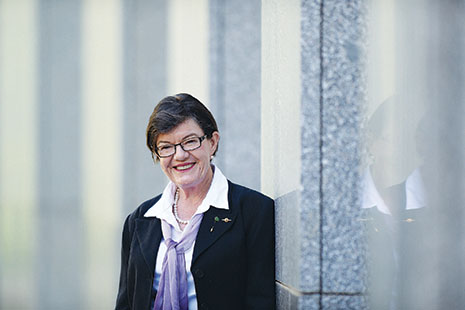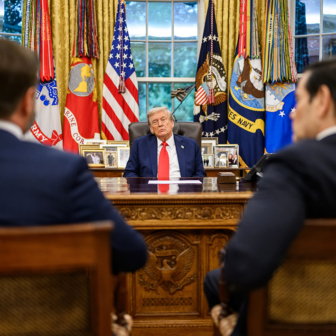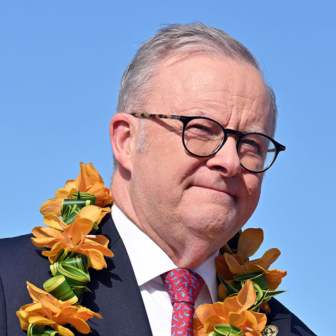WHEN the politicians are in town, the public areas of Parliament House are thronged with even more visitors than usual. The marble foyer echoes to the sound of dignitaries and delegations clamouring for security passes. Boisterous crocodile-lines of schoolchildren wind their way through the Members’ Hall; grey nomads can be found tut-tutting at the splendour of the Great Hall.
But I’m leaving the racket of this vox populi far behind. I pass through the soundproofed doors that separate the public from the private space of our elected officials and enter a zone of deep-carpeted quietude. Like a walled market town, this is where the members of the House of Representatives withdraw to after selling their wares.
I’m on my way to meet one of the most unlikely new recruits to this political marketplace. Following in the footsteps of respected rural independents like the late Peter Andren in Calare and the recently retired Tony Windsor in New England, Cathy McGowan is the independent member for Indi, a bush seat in northern Victoria.
At last year’s federal election she famously led a successful rebellion in this historically conservative electorate against the seat’s sitting member, the Liberal Party’s tough right-winger Sophie Mirabella. Spearheaded by a grassroots organisation called Voice for Indi, McGowan’s campaign thoroughly outmanoeuvred the complacent and divisive Mirabella, who barely had time to rearrange the deckchairs before her ship went down.
My guide to McGowan’s office is a neatly turned-out schoolteacher, Prue Noble, once a foot soldier in the Indi insurgency. As we walk together across a glassed-in bridge, I’m reminded once again that you can tell a lot about politicians by their staff.
Usually, like their bosses, they are insiders – with the insider’s innate suspicion of emissaries from the great world beyond. There are the press secretaries who plonk their tape recorder down next to yours (with the unspoken accusation that you can’t be trusted to quote their boss accurately) or the personal assistants who are far too busy waiting for the phone to ring to offer you a cup of tea.
But Prue, I soon find out, is a chatty, unjaded outsider – and a volunteer. Over the next three years, she explains, McGowan intends to rotate as many ordinary Voice for Indi people through her Canberra office as she can. In this way, she hopes hundreds of locals will get to experience first-hand national politics from the vantage point of an MP’s office.
So far Prue is enjoying every minute of this bold experiment. Both she and her fellow volunteer, Virginia Eccles – whom I meet when we arrive at the office – are being billeted in the national capital by former Indi residents now based in Canberra. They answer the phones and do paperwork, but they are more than just volunteer labour; they are, in effect, Indi ambassadors to Canberra; outsiders who have jumped the fence for a week.
They embody the values and ideas that Voice for Indi and McGowan say have been overlooked for too long in their electorate, and rural Australia generally: the need for greater participation, a respect for the role of women in small businesses and political decision-making, civility in public debate, a concern for the environment, and a progressive stance on social issues including gay marriage. As the two women fill me in on their duties it becomes clear that McGowan is not their boss, or their leader: she is their representative.
THE MEMBER for Indi is a petite, dark-haired, energetic fifty-nine-year-old with an engaging manner. You don’t really interview Cathy McGowan – you are drawn, almost against your will, into a conversation. Right now she’s explaining how politics looks from her newly acquired observation post; sitting up at the curved end of the House’s green benches.
“Question time to me feels like two rugby teams facing off,” she says, “It’s not like Australian Rules football, which to me is a game of art and skill – and unexpected delight – whereas rugby is just brute force.” When a crossbencher gets to ask a rare question, it’s like a referee’s whistle, she says: the brutality pauses. “There is absolute quiet. We get to ask legitimate questions and we always get legitimate answers.”
But it generally feels as if the major parties see the crossbenchers as five little kids who have thrown their ball into a game of grown-ups by accident. “Oh, we’ve got to humour them, they think – and they throw it back to us,” she says. “If it’s going to be a game, I would like it to be a game of grace and art and subtlety.”
McGowan says the crossbenchers – who she believes represent the full spectrum of Australian politics – get along pretty well. “You’ve got Bob Katter, agrarian conservative… Clive Palmer, Liberal – should be Liberal – money-making miner… Then me, sort of centre of the road… Then Andrew Wilkie [the independent who won a Labor seat in Hobart] and Adam Bandt from the Greens.”
McGowan is a conscientious attender of question time. She keeps a weather eye on proceedings while working away on her laptop. In fact, McGowan devours work; and she doesn’t like to waste time. On the day I observed her during question time she left the chamber on the dot of 3 pm, when question time officially finishes, her duty to parliament fulfilled. When I arrived to interview her, she ushered a delegation out of her office before dealing with me, took a phone call from Clive Palmer’s office while we talked, and then rushed off to a meeting as soon as we’d finished.
Though she will, of course, ask questions when she is given the Speaker’s call, performing in the choreographed charade of question time is not why she came to Canberra. Her ambition is a lot greater than that: she wants the people of Indi to embrace politics, to feel part of the process. That’s why she wants volunteers from the Indi community cross-pollinating with her office in Canberra. Members of the major parties would regard bringing inexperienced political operatives into your office as a mistake just waiting to happen. McGowan thinks it’s her raison d’être.
THE SEAT of Indi stretches from the bushland homes of Victoria’s “tree changers” in Mansfield and Myrtleford all the way north to the Murray River. In between are national parks, snowfields, prime farmland, several largish towns – Benalla, Glenrowan and Wangaratta (or just Wang, as everyone in McGowan’s office calls it) – and the city of Wodonga.
Until McGowan’s win last year, Indi had been held exclusively by the conservative side of Australian politics since 1931. To understand how McGowan pulled off this unlikely victory you have to understand the many positives she brought to the contest, and the almost equal number of negatives attached to her opponent, the seat’s sitting member, Sophie Mirabella.
McGowan is an Indi local, born and bred. She owns a small sheep farm in the Indigo Valley, where she’s lived all her life. She comes from a big Catholic family with deep roots in the area. Having twelve siblings means McGowan – who has no children of her own – can also access a tribe of nieces and nephews, many of whom have proved to be tech-savvy champions of her cause. She is also deeply respected in the electorate for her work as a rural business consultant. Long before she became an MP, McGowan had helped lobby successfully for a school to be set up for the area’s famous Flying Fruit Fly Circus, for home and community care services, and for palliative care units and mobile childcare for farming families.
She became a rural affairs adviser to the Victorian government, scored a Churchill Fellowship, finished a master’s degree in applied science, joined the Australian Rural Leadership Program, and got elected to the Victorian Farmers’ Federation policy body. By the time she was in her late forties, she was the rural candidate from central casting. She had even worked in Canberra in the 1980s for the electorate’s Liberal MP, Ewen Cameron. The local Liberal Party must still be kicking itself for never having had the wit to tap her on the shoulder.
But the Liberals didn’t woo McGowan, or any other well-credentialed local for that matter. Instead they preselected an abrasive Melbourne barrister called Sophie Panopolous, who went on to win the seat at the 2001 election.
A decade later two things had changed: Panopolous, now married, was Sophie Mirabella; and the voters of Indi were getting fed-up with the abrasive politician whom the Liberal Party in its wisdom had chosen to represent them in this traditionally safe seat. It has been reported, for example, that when a group of constituents met with her to discuss the problem of mobile phone black spots in the electorate, Mirabella told them that “the people of Indi weren’t interested in politics.” They were back on the footpath after a mere eleven minutes.
In May 2012 an informal group of young people from the electorate who had moved to Melbourne in pursuit of education and jobs started lobbying for change. These so-called Indi expats, several of whom were McGowan’s nieces and nephews, persuaded older people who still lived in the seat to contemplate Indi’s problems. Voice for Indi was born, and started conducting “kitchen conversations” across the electorate to gather information about local issues. Soon, they discovered there was a widespread sense of discontent about transport, communications, climate change, marriage equality, broadband access, and a local member who wasn’t prepared to listen. It was obvious: someone would have to take on Mirabella at the looming federal election. Cornered by her young relatives, McGowan reluctantly agreed to run as an independent.
It was, by Australian standards, an extraordinary campaign. There were the traditional doorknockings, leafletings and meetings held in drafty halls. But there was also the sophisticated use of social media to gather support: Twitter and Facebook to raise awareness, and crowd-funding software to raise money. McGowan’s small army of volunteers was kitted out in bright orange t-shirts and asked to sign a contract to remain polite and respectful on all occasions. They were also given a level of responsibility and autonomy that is unheard of in the campaigns run by the major parties. Famously, one group of volunteers “cash mobbed” a florist shop and bought $20 worth of flowers each, which they promptly donated to local nursing homes. And they didn’t forget to invite along the local media.
Mirabella never knew what hit her. After preferences were distributed, she had copped a savage 10.2 per cent swing, and was the only sitting Liberal in the 2013 election to be defeated. Indi’s former MP has recently been made a public policy fellow at the University of Melbourne – where, no doubt, she’ll be usefully employed instructing fascinated students in the neglected art of how to lose a safe seat without really trying.
But now the euphoria of victory has begun to wear off for McGowan, a new question has arisen: where to from here?
CATHY McGOWAN has spent her first six months or so in office getting the mundane essentials of politics bedded down. She’s set up her offices in parliament and the electorate, appointed staff, accepted several speaking engagements, and started talking to the national media. When I spoke to her she was prepping for the May budget.
With two-and-a-half years left of her term, she is on the cusp of making her mark: choosing battles, forging alliances and stepping on toes. She is a proven strategic thinker. And she obviously wants to make a difference. So what kind of achievable legacy is within her grasp as an independent?
It’s early days – and in politics events have a nasty habit of intruding on even the best-laid plans – but in talking to McGowan I began to sense the shape of her longer-term ambitions. She wants to remake the relationship between the voters of Indi and their elected representative. She wants to present a fresher image of life in rural Australia. And she wants to remind the Coalition that it can’t take the support of rural voters for granted. “I got here on a grassroots movement of people,” she says, “and I’m absolutely committed to that in Indi.”
She thinks her biggest influence will come from how she operates as a politician – how she lives up to her own high standards of behaviour and the high standards expected of her by the voters of Indi. Her greatest legacy, she hopes, will be if politics comes to be seen by Indi’s voters as more of an authentic contest of ideas and values. “We will grow knowledge in the community of how politics works,” she explains. “And I am pretty confident that we can do that over three years, so that there will be a much greater understanding and appreciation of how the process works and how people engage in it.”
If, at the next election, Indi is a better-informed and more engaged electorate, then McGowan thinks that this would be her real victory. “It really won’t matter, truly, if I lose, because whoever wins will be better than me,” she says. “And they will have more to offer Indi.”
She also wants to change the perceptions of voters outside the electorate. The National Party traditionally peddles a negative story about country Australia – a vision of a bush beset by problems that always seem to require taxpayers’ money to put right. McGowan is no Pollyanna, but she wants the rest of Australia to see a different picture. Problems exist in Indi, for sure: youth unemployment, suicide, lack of healthcare, scarce educational opportunities. But when she describes her electorate McGowan uses words like “vibrant,” “buoyant” and “positive.” She believes that National Party figures “don’t get” the changes occurring in their backyard. “What I experience in northeast Victoria is modern, sophisticated, rural living.”
McGowan says that the parochial rhetoric that has been the stock-in-trade of the National Party is under assault. She assures me, for example, that gay marriage is not a divisive issue in her electorate. The young are in favour of it, and the aged are no longer against it.
Many of these changes can be put down to the inroads feminism has made in the bush. Women voters, in particular, seem to be attracted to rural independents. McGowan helped to found (and later became national president of) Australian Women in Agriculture, a network of rural women who run businesses, and want to run bigger businesses. According to McGowan, these influential country women loved what happened in Indi.
“They get it that politics is not working for them. It doesn’t give them childcare; it doesn’t give them broadband; it doesn’t give them the best education for their kids. And the National Party is not doing any of that… so all my women friends and colleagues are going, ‘Good on you!’”
All this adds up to some important lessons for the major conservative parties: if they don’t handle their bush seats with care, they run the risk of losing them to an independent. And bush voters are loyal. In her own way McGowan is as impressive as Tony Windsor and Peter Andren, who were both returned to parliament repeatedly.
So is McGowan concerned that the Abbott government could attempt to buy back Indi with big greasy barrels of pork? “Oh, God, I’m wanting it to happen – I couldn’t think of anything nicer. Indi has never had largesse; no one’s ever paid any attention to us.”
And what if the government took a different tack and decided to put Indi in the naughty chair by withholding money and projects? “Well, the government could punish us,” she says with a wry smile, “but no one would notice.” •




